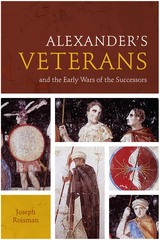
This first focused analysis of veterans’ experiences in ancient Greece offers a fresh, “bottom-up” perspective on important military and political aspects of early Hellenistic history.
Runner-up, PROSE Award, Classics and Ancient History, 2013
From antiquity until now, most writers who have chronicled the events following the death of Alexander the Great have viewed this history through the careers, ambitions, and perspectives of Alexander’s elite successors. Few historians have probed the experiences and attitudes of the ordinary soldiers who followed Alexander on his campaigns and who were divided among his successors as they fought for control of his empire after his death. Yet the veterans played an important role in helping to shape the character and contours of the Hellenistic world.
This pathfinding book offers the first in-depth investigation of the Macedonian veterans’ experience during a crucial turning point in Greek history (323–316 BCE). Joseph Roisman discusses the military, social, and political circumstances that shaped the history of Alexander’s veterans, giving special attention to issues such as the soldiers’ conduct on and off the battlefield, the army assemblies, the volatile relationship between the troops and their generals, and other related themes, all from the perspective of the rank-and-file. Roisman also reexamines the biases of the ancient sources and how they affected ancient and modern depictions of Alexander’s veterans, as well as Alexander’s conflicts with his army, the veterans’ motives and goals, and their political contributions to Hellenistic history. He pays special attention to the Silver Shields, a group of Macedonian veterans famous for their invincibility and martial prowess, and assesses whether or not they deserved their formidable reputation.

An esteemed teacher offers a major reassessment of the history of Greece from prehistoric times to the rise of Alexander. This is a work of prodigious scholarship written in grand style.
John Fine surveys the archaeological work that has revealed so much about the civilization of Crete and Mycenaean Greece, and discusses the age of colonization during which Greek colonies were established from the Crimea to the Nile, from the Caucasus to Spain. Analyzing social and economic developments, as well as foreign and inter-city affairs, he assesses the history, culture, and democracy of Athens, and Sparta’s institutions and military exploits; recounts the Greeks’ relations and then war with the Persian empire; details alliances, struggles, and the varying fortunes of the Greek city-states; and relates the rise of Macedon. Fine treats the Greeks’ story in the context of events elsewhere in the eastern Mediterranean. Throughout he indicates the nature of the evidence on which our present knowledge is based, masterfully explaining the problems and pitfalls in interpreting ancient accounts. The Ancient Greeks is a splendid narrative history and a refreshing reinterpretation that will please students of ancient history, and everyone interested in early civilizations.

This book is a study of the variable perceptions of Greek collective identity, discussing ancient categories such as blood- and mythically-related primordiality, language, religion, and culture. With less emphasis on dichotomies between Greeks and others, the book considers complex middle grounds of intra-Hellenic perceptions, oppositional identities, and outsiders’ views. Although the authors do not seek to provide a litmus test of Greek identity, they do pay close attention to modern theories of ethnicity, its construction, function, and representation, and assess their applicability to views of Greekness in antiquity.
From the Archaic period through the Roman Empire, archaeological, anthropological, historical, historiographical, rhetorical, artistic, and literary aspects are studied. Regardless of the invented aspects of ethnicity, the book illustrates its force and validity in history.
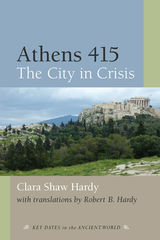
On a summer night in 415 BCE, unknown persons systematically mutilated most of the domestic “herms”—guardian statues of the god Hermes—in Athens. The reaction was immediate and extreme: the Athenians feared a terrifying conspiracy was underway against the city and its large fleet—and possibly against democracy itself. The city established a board of investigators, which led to informants, accusations, and flight by many of the accused. Ultimately, dozens were exiled or executed, their property confiscated.
This dramatic period offers the opportunity to observe the city in crisis. Sequential events allow us to see the workings of the major institutions of the city (assembly, council, law courts, and theater, as well as public and private religion). Remarkably, the primary sources for these tumultuous months name conspirators and informants from a very wide range of status-groups: citizens, women, slaves, and free residents. Thus the incident provides a particularly effective entry-point into a full multifaceted view of the way Athens worked in the late fifth century.
Designed for classroom use, Athens 415 is no potted history, but rather a source-based presentation of ancient urban life ideal for the study of a people and their institutions and beliefs. Original texts—all translated by poet Robert B. Hardy—are presented along with thoughtful discussion and analyses by Clara Shaw Hardy in an engaging narrative that draws students into Athens’ crisis.
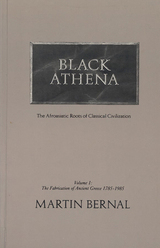
Winner of the American Book Award, 1990.
Could Greek philosophy be rooted in Egyptian thought? Is it possible that the Pythagorean theory was conceived on the shores of the Nile and the Euphrates rather than in ancient Greece? Could it be that Western civilization was born on the so-called Dark Continent? For almost two centuries, Western scholars have given little credence to the possibility of such scenarios.
In Black Athena, an audacious three-volume series that strikes at the heart of today's most heated culture wars, Martin Bernal challenges Eurocentric attitudes by calling into question two of the longest-established explanations for the origins of classical civilization. The Aryan Model, which is current today, claims that Greek culture arose as the result of the conquest from the north by Indo-European speakers, or "Aryans," of the native "pre-Hellenes." The Ancient Model, which was maintained in Classical Greece, held that the native population of Greece had initially been civilized by Egyptian and Phoenician colonists and that additional Near Eastern culture had been introduced to Greece by Greeks studying in Egypt and Southwest Asia. Moving beyond these prevailing models, Bernal proposes a Revised Ancient Model, which suggests that classical civilization in fact had deep roots in Afroasiatic cultures.
This long-awaited third and final volume of the series is concerned with the linguistic evidence that contradicts the Aryan Model of ancient Greece. Bernal shows how nearly 40 percent of the Greek vocabulary has been plausibly derived from two Afroasiatic languages-Ancient Egyptian and West Semitic. He also reveals how these derivations are not limited to matters of trade, but extended to the sophisticated language of politics, religion, and philosophy. This evidence, according to Bernal, confirms the fact that in Greece an Indo-European people was culturally dominated by speakers of Ancient Egyptian and West Semitic.
Provocative, passionate, and colossal in scope, this volume caps a thoughtful rewriting of history that has been stirring academic and political controversy since the publication of the first volume.
"A work which has much to offer the lay reader, and its multi-disciplinary sweep is refreshing: it is an important contribution to his to historiography and the sociology of knowledge, written with elegance, wit, and self-awareness... a thrilling journey... his account is as gripping a tale of scholarly detection and discovery as one could hope to find." -- Margaret Drabble, The Observer
"An astonishing work, breathtaking bold in conception and passionately written... salutary, exciting, and in its historiographical aspects, convincing." -- G. W. Bowersock, Institute for Advanced Study, Princeton
"The next far in book.... A formidable work of intellectual history." -- Christian Science Monitor
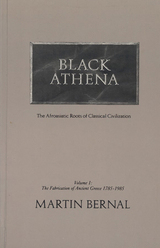
Winner of the American Book Award, 1990.
This volume is the second in a projected four-part series concerned with the competition between two historical models for the origins of Greek civilization. The model current today is the Aryan Model, according to which Greek culture arose as the result of the conquest from the north by Indo-European speakers or "Aryans" of the native "pre-Hellenes." The Ancient Model, which was the model maintained in Classical Greece, held that the native population of Greece had initially been civilized by Egyptian and Phoenician colonists and that more Near Eastern culture had been introduced to Greece by Greeks studying in Egypt and Southwest Asia. In these and later volumes, Martin Bernal proposes a Revised Ancient Model. According to this, the Indo-European aspects of Greek language and culture should be recognized as fundamental and the considerable non-Indo-European elements should be seen largely as Egyptian and Levantine additions to this basis.
Volume II is concerned with the archaeological and documentary evidence for contacts between Egypt and the Levant on the one hand and the Aegean on the other, during the Bronze Age from c. 3400 B.C. to c. 1100 B.C. These approaches are supplemented by information from later Greek myths, legends, religious cults, and language. The author concludes that contact between the two regions was far more extensive and influential than is generally believed. In the introduction to this volume, Bernal also responds to some reviews and criticisms of Volume I of Black Athena.
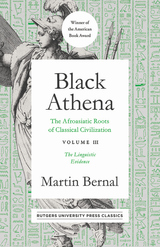
What is classical about Classical civilization? In one of the most audacious works of scholarship ever written, Martin Bernal challenges the foundation of our thinking about this question. Classical civilization, he argues, has deep roots in Afroasiatic cultures. But these Afroasiatic influences have been systematically ignored, denied or suppressed since the eighteenth century—chiefly for racist reasons.
The popular view is that Greek civilization was the result of the conquest of a sophisticated but weak native population by vigorous Indo-European speakers—Aryans—from the North. But the Classical Greeks, Bernal argues, knew nothing of this “Aryan model.” They did not see their institutions as original, but as derived from the East and from Egypt in particular.
This long-awaited third and final volume of the series is concerned with the linguistic evidence that contradicts the Aryan Model of ancient Greece. Bernal shows how nearly 40 percent of the Greek vocabulary has been plausibly derived from two Afroasiatic languages – Ancient Egyptian and West Semitic. He also reveals how these derivations are not limited to matters of trade, but extended to the sophisticated language of politics, religion, and philosophy. This evidence, according to Bernal, greatly strengthens the hypothesis that in Greece an Indo-European-speaking population was culturally dominated by Ancient Egyptian and West Semitic speakers.
Provocative, passionate, and colossal in scope, this volume caps a thoughtful rewriting of history that has been stirring academic and political controversy since the publication of the first volume.
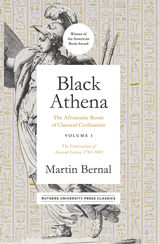
What is classical about Classical civilization? In one of the most audacious works of scholarship ever written, Martin Bernal challenges the foundation of our thinking about this question. Classical civilization, he argues, has deep roots in Afroasiatic cultures. But these Afroasiatic influences have been systematically ignored, denied or suppressed since the eighteenth century—chiefly for racist reasons.
The popular view is that Greek civilization was the result of the conquest of a sophisticated but weak native population by vigorous Indo-European speakers—Aryans—from the North. But the Classical Greeks, Bernal argues, knew nothing of this “Aryan model.” They did not see their institutions as original, but as derived from the East and from Egypt in particular.
In an unprecedented tour de force, Bernal links a wide range of areas and disciplines—drama, poetry, myth, theological controversy, esoteric religion, philosophy, biography, language, historical narrative, and the emergence of “modern scholarship.”
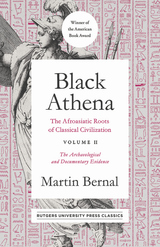
What is classical about Classical civilization? In one of the most audacious works of scholarship ever written, Martin Bernal challenges the foundation of our thinking about this question. Classical civilization, he argues, has deep roots in Afroasiatic cultures. But these Afroasiatic influences have been systematically ignored, denied or suppressed since the eighteenth century—chiefly for racist reasons.
The popular view is that Greek civilization was the result of the conquest of a sophisticated but weak native population by vigorous Indo-European speakers—Aryans—from the North. But the Classical Greeks, Bernal argues, knew nothing of this “Aryan model.” They did not see their institutions as original, but as derived from the East and from Egypt in particular.
In an unprecedented tour de force, Bernal links a wide range of areas and disciplines—drama, poetry, myth, theological controversy, esoteric religion, philosophy, biography, language, historical narrative, and the emergence of “modern scholarship.”
This volume is the second in a three-part series concerned with the competition between two historical models for the origins of Greek civilization. Volume II is concerned with the archaeological and documentary evidence for contacts between Egypt and the Levant on the one hand, and the Aegean on the other, during the Bronze Age from c. 34000 BC to c. 1100 BC. These approaches are supplemented by information from later Greek myths, legends, religious cults, and language. The author concludes that contact between the two regions was far more extensive and influential than is generally believed. In the introduction to this volume, Bernal also responds to some reviews and criticism of Volume I of Black Athena.

The subsequent rancor among classicists over Bernal’s theory and accusations was picked up in the popular media, and his suggestion that Greek culture had its origin in Africa was widely derided. In a report on 60 Minutes, for example, it was suggested that Bernal’s hypothesis was essentially an attempt to provide blacks with self-esteem so that they would feel included in the march of progress.
In Black Athena Writes Back Bernal provides additional documentation to back up his thesis, as well as offering persuasive explanations of why traditional scholarship on the subject remains inaccurate and why specific arguments lobbed against his theories are themselves faulty.
Black Athena Writes Back requires no prior familiarity with either the Black Athena hypothesis or with the arguments advanced against it. It will be essential reading for those who have been following this long-running debate, as well as for those just discovering this fascinating subject.

The Africans who came to ancient Greece and Italy participated in an important chapter of classical history. Although evidence indicated that the alien dark- and black-skinned people were of varied tribal and geographic origins, the Greeks and Romans classified many of them as Ethiopians. In an effort to determine the role of black people in ancient civilization, Mr. Snowden examines a broad span of Greco-Roman experience--from the Homeric era to the age of Justinian--focusing his attention on the Ethiopians as they were known to the Greeks and Romans. The author dispels unwarranted generalizations about the Ethiopians, contending that classical references to them were neither glorifications of a mysterious people nor caricatures of rare creatures.
Mr. Snowden has probed literary, epigraphical, papyrological, numismatic, and archaeological sources and has considered modern anthropological and sociological findings on pertinent racial and intercultural problems. He has drawn directly upon the widely scattered literary evidence of classical and early Christian writers and has synthesized extensive and diverse material. Along with invaluable reference notes, Mr. Snowden has included over 140 illustrations which depict the Negro as the Greeks and Romans conceived of him in mythology and religion and observed him in a number of occupations--as servant, diplomat, warrior, athlete, and performer, among others.
Presenting an exceptionally comprehensive historical description of the first major encounter of Europeans with dark and black Africans, Mr. Snowden found that the black man in a predominantly white society was neither romanticized nor scorned--that the Ethiopian in classical antiquity was considered by pagan and Christian without prejudice.
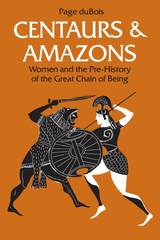
In Centaurs and Amazons, Page duBois offers a prehistory of hierarchy. Using structural anthropology, symbolic analysis, and recent literary theory, she demonstrates a shift in Greek thought from the fifth to the fourth century B.C. that had a profound influence upon subsequent Western culture and politics.
Through an analysis of mythology, drama, sculpture, architecture, and Greek vase painting, duBois documents the transition from a system of thought that organized the experience of difference in terms of polarity and analogy to one based upon a relatively rigid hierarchical scheme. This was the beginning of "the great chain of being," the philosophical construct that all life was organized in minute gradations of superiority and inferiority. This scheme, in various guises, has continued to influence philosophical and political thought.
The author's intelligent and discriminating use of scholarship from various fields makes Centaurs and Amazons an impressive interdisciplinary study of interest to classicists, feminist scholars, historians, art historians, anthropologists, and political scientists.
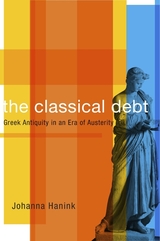
Ever since the International Monetary Fund’s first bailout of Greece’s sinking economy in 2010, the phrase “Greek debt” has meant one thing to the country’s creditors. But for millions who claim to prize culture over capital, it means something quite different: the symbolic debt that Western civilization owes to Greece for furnishing its principles of democracy, philosophy, mathematics, and fine art. Where did this other idea of Greek debt come from, Johanna Hanink asks, and why does it remain so compelling today?
The Classical Debt investigates our abiding desire to view Greece through the lens of the ancient past. Though classical Athens was in reality a slave-owning imperial power, the city-state of Socrates and Pericles is still widely seen as a utopia of wisdom, justice, and beauty—an idealization that the ancient Athenians themselves assiduously cultivated. Greece’s allure as a travel destination dates back centuries, and Hanink examines many historical accounts that express disappointment with a Greek people who fail to live up to modern fantasies of the ancient past. More than any other movement, the spread of European philhellenism in the eighteenth and nineteenth centuries carved idealized conceptions of Greece in marble, reinforcing the Western habit of comparing the Greece that is with the Greece that once was.
Today, as the European Union teeters and neighboring nations are convulsed by political unrest and civil war, Greece finds itself burdened by economic hardship and an unprecedented refugee crisis. Our idealized image of ancient Greece dangerously shapes how we view these contemporary European problems.

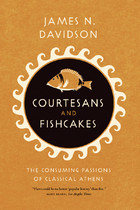
As any reader of the Symposium knows, the ancient Greek philosopher Socrates conversed over lavish banquets, kept watch on who was eating too much fish, and imbibed liberally without ever getting drunk. In other words, James Davidson writes, he reflected the culture of ancient Greece in which he lived, a culture of passions and pleasures, of food, drink, and sex before—and in concert with—politics and principles. Athenians, the richest and most powerful of the Greeks, were as skilled at consuming as their playwrights were at devising tragedies. Weaving together Greek texts, critical theory, and witty anecdotes, this compelling and accessible study teaches the reader a great deal, not only about the banquets and temptations of ancient Athens, but also about how to read Greek comedy and history.

Kitharoidia was arguably the most popular, most geographically widespread, and longest-running performance genre in antiquity. From the archaic period to the late Roman imperial era, citharodes enjoyed star status, playing their songs to vast crowds at festival competitions and concerts throughout the Mediterranean world.
The Culture of Kitharoidia is the first study dedicated exclusively to the art, practice, and charismatic persona of the citharode. Traversing a wide range of discourse and imagery about kitharoidia—poetic and prose texts, iconography, inscriptions—the book offers a nuanced account of the aesthetic and sociocultural complexities of citharodic song and examines the iconic role of the songmakers in the popular imagination, from mythical citharodes such as Orpheus to the controversial innovator Timotheus, to that most notorious of musical dilettantes, Nero.
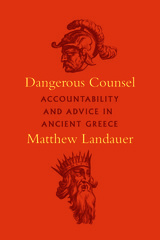
With Dangerous Counsel, Matthew Landauer analyzes the sometimes ferocious and unpredictable politics of accountability in ancient Greece and offers novel readings of ancient history, philosophy, rhetoric, and drama. In comparing the demos to a tyrant, thinkers such as Herodotus, Plato, Isocrates, and Aristophanes were attempting to work out a theory of the badness of unaccountable power; to understand the basic logic of accountability and why it is difficult to get right; and to explore the ways in which political discourse is profoundly shaped by institutions and power relationships. In the process they created strikingly portable theories of counsel and accountability that traveled across political regime types and remain relevant to our contemporary political dilemmas.

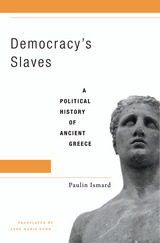
The ancient Greek statesman is a familiar figure in the Western political tradition. Less well known is the administrator who ran the state but who was himself a slave. Challenging the modern belief that democracy and bondage are incompatible, Paulin Ismard directs our attention to the cradle of Western democracy, ancient Athens, where the functioning of civic government depended crucially on highly skilled experts who were literally public servants—slaves owned by the city-state rather than by private citizens.
Known as dēmosioi, these public slaves filled a variety of important roles in Athenian society. They were court clerks, archivists, administrators, accountants, and policemen. Many possessed knowledge and skills beyond the attainments of average citizens, and they enjoyed privileges, such as the right to own property, that were denied to private slaves. In effect, dēmosioi were Western civilization’s first civil servants—though they carried out their duties in a condition of bound servitude.
Ismard detects a radical split between politics and administrative government at the heart of Athenian democracy. The city-state’s managerial caste freed citizens from the day-to-day responsibilities of running the state. By the same token, these public servants were unable to participate in the democratic process because they lacked the rights of full citizenship. By rendering the state’s administrators politically invisible, Athens warded off the specter of a government capable of turning against the citizens’ will. In a real sense, Ismard shows, Athenian citizens put the success of their democratic experiment in the hands of slaves.

Within the space of three centuries leading up to the great Persian invasion of 480 BC, Greece was transformed from a simple peasant society into a sophisticated civilization that dominated the shores of the Mediterranean from Spain to Syria and from the Crimea to Egypt—a culture whose achievements in the fields of art, science, philosophy, and politics were to establish the canons of the the Western world.
Oswyn Murray places this remarkable development in the context of Mediterranean civilization. He shows how contact with the East catalyzed the transformation of art and religion, analyzes the invention of the alphabet and the conceptual changes it brought, describes the expansions of Greece in trade and colonization, and investigates the relationship between military technology and political progress in the overthrow of aristocratic governments.

A major new edition of the so-called Presocratics.
The fragments and testimonia of the early Greek philosophers (often labeled the ‘Presocratics’) have always been not only a fundamental source for understanding archaic Greek culture and ancient philosophy but also a perennially fresh resource that has stimulated Western thought until the present day. This new systematic conception and presentation of the evidence differs in three ways from Hermann Diels’s groundbreaking work, as well as from later editions: it renders explicit the material’s thematic organization; it includes a selection from such related bodies of evidence as archaic poetry, classical drama, and the Hippocratic corpus; and it presents an overview of the reception of these thinkers until the end of antiquity.
Volume I contains introductory and reference materials essential for using all other parts of the edition.
Volume II presents preliminary chapters on ancient doxography, the cosmological and moral background, and includes the early Ionian thinkers Pherecydes, Thales, Anaximander, and Anaximenes.
Volume III includes the early Ionian thinkers Xenophanes and Heraclitus.
Volume IV presents Pythagoras and the Pythagorean School, including Hippasus, Philolaus, Eurytus, Archytas, Hicetas, and Ecphantus, along with chapters on doctrines not attributed by name and reception.
Volume V includes the western Greek thinkers Parmenides, Zeno, Melissus, Empedocles, Alcmaeon, and Hippo.
Volume Vi includes the later Ionian and Athenian thinkers Anaxagoras, Archelaus, and Diogenes of Apollonia, along with chapters on early Greek medicine and the Derveni Papyrus.
Volume VII includes the atomists Leucippus and Democritus.
Volume VIII includes the so-called sophists Protagoras, Gorgias, Prodicus, Thrasymachus, and Hippias, along with testimonia relating to the life, views, and argumentative style of Socrates.
Volume IX includes the so-called sophists Antiphon, Lycophron, and Xeniades, along with the Anonymous of Iamblichus, the Dissoi Logoi, a chapter on characterizations of the ‘sophists’ as a group, and an appendix on philosophy and philosophers in Greek drama.

A major new edition of the so-called Presocratics.
The fragments and testimonia of the early Greek philosophers (often labeled the ‘Presocratics’) have always been not only a fundamental source for understanding archaic Greek culture and ancient philosophy but also a perennially fresh resource that has stimulated Western thought until the present day. This new systematic conception and presentation of the evidence differs in three ways from Hermann Diels’s groundbreaking work, as well as from later editions: it renders explicit the material’s thematic organization; it includes a selection from such related bodies of evidence as archaic poetry, classical drama, and the Hippocratic corpus; and it presents an overview of the reception of these thinkers until the end of antiquity.
Volume I contains introductory and reference materials essential for using all other parts of the edition.
Volume II presents preliminary chapters on ancient doxography, the cosmological and moral background, and includes the early Ionian thinkers Pherecydes, Thales, Anaximander, and Anaximenes.
Volume III includes the early Ionian thinkers Xenophanes and Heraclitus.
Volume IV presents Pythagoras and the Pythagorean School, including Hippasus, Philolaus, Eurytus, Archytas, Hicetas, and Ecphantus, along with chapters on doctrines not attributed by name and reception.
Volume V includes the western Greek thinkers Parmenides, Zeno, Melissus, Empedocles, Alcmaeon, and Hippo.
Volume Vi includes the later Ionian and Athenian thinkers Anaxagoras, Archelaus, and Diogenes of Apollonia, along with chapters on early Greek medicine and the Derveni Papyrus.
Volume VII includes the atomists Leucippus and Democritus.
Volume VIII includes the so-called sophists Protagoras, Gorgias, Prodicus, Thrasymachus, and Hippias, along with testimonia relating to the life, views, and argumentative style of Socrates.
Volume IX includes the so-called sophists Antiphon, Lycophron, and Xeniades, along with the Anonymous of Iamblichus, the Dissoi Logoi, a chapter on characterizations of the ‘sophists’ as a group, and an appendix on philosophy and philosophers in Greek drama.

A major new edition of the so-called Presocratics.
The fragments and testimonia of the early Greek philosophers (often labeled the ‘Presocratics’) have always been not only a fundamental source for understanding archaic Greek culture and ancient philosophy but also a perennially fresh resource that has stimulated Western thought until the present day. This new systematic conception and presentation of the evidence differs in three ways from Hermann Diels’s groundbreaking work, as well as from later editions: it renders explicit the material’s thematic organization; it includes a selection from such related bodies of evidence as archaic poetry, classical drama, and the Hippocratic corpus; and it presents an overview of the reception of these thinkers until the end of antiquity.
Volume I contains introductory and reference materials essential for using all other parts of the edition.
Volume II presents preliminary chapters on ancient doxography, the cosmological and moral background, and includes the early Ionian thinkers Pherecydes, Thales, Anaximander, and Anaximenes.
Volume III includes the early Ionian thinkers Xenophanes and Heraclitus.
Volume IV presents Pythagoras and the Pythagorean School, including Hippasus, Philolaus, Eurytus, Archytas, Hicetas, and Ecphantus, along with chapters on doctrines not attributed by name and reception.
Volume V includes the western Greek thinkers Parmenides, Zeno, Melissus, Empedocles, Alcmaeon, and Hippo.
Volume Vi includes the later Ionian and Athenian thinkers Anaxagoras, Archelaus, and Diogenes of Apollonia, along with chapters on early Greek medicine and the Derveni Papyrus.
Volume VII includes the atomists Leucippus and Democritus.
Volume VIII includes the so-called sophists Protagoras, Gorgias, Prodicus, Thrasymachus, and Hippias, along with testimonia relating to the life, views, and argumentative style of Socrates.
Volume IX includes the so-called sophists Antiphon, Lycophron, and Xeniades, along with the Anonymous of Iamblichus, the Dissoi Logoi, a chapter on characterizations of the ‘sophists’ as a group, and an appendix on philosophy and philosophers in Greek drama.

A major new edition of the so-called Presocratics.
The fragments and testimonia of the early Greek philosophers (often labeled the ‘Presocratics’) have always been not only a fundamental source for understanding archaic Greek culture and ancient philosophy but also a perennially fresh resource that has stimulated Western thought until the present day. This new systematic conception and presentation of the evidence differs in three ways from Hermann Diels’s groundbreaking work, as well as from later editions: it renders explicit the material’s thematic organization; it includes a selection from such related bodies of evidence as archaic poetry, classical drama, and the Hippocratic corpus; and it presents an overview of the reception of these thinkers until the end of antiquity.
Volume I contains introductory and reference materials essential for using all other parts of the edition.
Volume II presents preliminary chapters on ancient doxography, the cosmological and moral background, and includes the early Ionian thinkers Pherecydes, Thales, Anaximander, and Anaximenes.
Volume III includes the early Ionian thinkers Xenophanes and Heraclitus.
Volume IV presents Pythagoras and the Pythagorean School, including Hippasus, Philolaus, Eurytus, Archytas, Hicetas, and Ecphantus, along with chapters on doctrines not attributed by name and reception.
Volume V includes the western Greek thinkers Parmenides, Zeno, Melissus, Empedocles, Alcmaeon, and Hippo.
Volume Vi includes the later Ionian and Athenian thinkers Anaxagoras, Archelaus, and Diogenes of Apollonia, along with chapters on early Greek medicine and the Derveni Papyrus.
Volume VII includes the atomists Leucippus and Democritus.
Volume VIII includes the so-called sophists Protagoras, Gorgias, Prodicus, Thrasymachus, and Hippias, along with testimonia relating to the life, views, and argumentative style of Socrates.
Volume IX includes the so-called sophists Antiphon, Lycophron, and Xeniades, along with the Anonymous of Iamblichus, the Dissoi Logoi, a chapter on characterizations of the ‘sophists’ as a group, and an appendix on philosophy and philosophers in Greek drama.

A major new edition of the so-called Presocratics.
The fragments and testimonia of the early Greek philosophers (often labeled the ‘Presocratics’) have always been not only a fundamental source for understanding archaic Greek culture and ancient philosophy but also a perennially fresh resource that has stimulated Western thought until the present day. This new systematic conception and presentation of the evidence differs in three ways from Hermann Diels’s groundbreaking work, as well as from later editions: it renders explicit the material’s thematic organization; it includes a selection from such related bodies of evidence as archaic poetry, classical drama, and the Hippocratic corpus; and it presents an overview of the reception of these thinkers until the end of antiquity.
Volume I contains introductory and reference materials essential for using all other parts of the edition.
Volume II presents preliminary chapters on ancient doxography, the cosmological and moral background, and includes the early Ionian thinkers Pherecydes, Thales, Anaximander, and Anaximenes.
Volume III includes the early Ionian thinkers Xenophanes and Heraclitus.
Volume IV presents Pythagoras and the Pythagorean School, including Hippasus, Philolaus, Eurytus, Archytas, Hicetas, and Ecphantus, along with chapters on doctrines not attributed by name and reception.
Volume V includes the western Greek thinkers Parmenides, Zeno, Melissus, Empedocles, Alcmaeon, and Hippo.
Volume Vi includes the later Ionian and Athenian thinkers Anaxagoras, Archelaus, and Diogenes of Apollonia, along with chapters on early Greek medicine and the Derveni Papyrus.
Volume VII includes the atomists Leucippus and Democritus.
Volume VIII includes the so-called sophists Protagoras, Gorgias, Prodicus, Thrasymachus, and Hippias, along with testimonia relating to the life, views, and argumentative style of Socrates.
Volume IX includes the so-called sophists Antiphon, Lycophron, and Xeniades, along with the Anonymous of Iamblichus, the Dissoi Logoi, a chapter on characterizations of the ‘sophists’ as a group, and an appendix on philosophy and philosophers in Greek drama.

A major new edition of the so-called Presocratics.
The fragments and testimonia of the early Greek philosophers (often labeled the ‘Presocratics’) have always been not only a fundamental source for understanding archaic Greek culture and ancient philosophy but also a perennially fresh resource that has stimulated Western thought until the present day. This new systematic conception and presentation of the evidence differs in three ways from Hermann Diels’s groundbreaking work, as well as from later editions: it renders explicit the material’s thematic organization; it includes a selection from such related bodies of evidence as archaic poetry, classical drama, and the Hippocratic corpus; and it presents an overview of the reception of these thinkers until the end of antiquity.
Volume I contains introductory and reference materials essential for using all other parts of the edition.
Volume II presents preliminary chapters on ancient doxography, the cosmological and moral background, and includes the early Ionian thinkers Pherecydes, Thales, Anaximander, and Anaximenes.
Volume III includes the early Ionian thinkers Xenophanes and Heraclitus.
Volume IV presents Pythagoras and the Pythagorean School, including Hippasus, Philolaus, Eurytus, Archytas, Hicetas, and Ecphantus, along with chapters on doctrines not attributed by name and reception.
Volume V includes the western Greek thinkers Parmenides, Zeno, Melissus, Empedocles, Alcmaeon, and Hippo.
Volume Vi includes the later Ionian and Athenian thinkers Anaxagoras, Archelaus, and Diogenes of Apollonia, along with chapters on early Greek medicine and the Derveni Papyrus.
Volume VII includes the atomists Leucippus and Democritus.
Volume VIII includes the so-called sophists Protagoras, Gorgias, Prodicus, Thrasymachus, and Hippias, along with testimonia relating to the life, views, and argumentative style of Socrates.
Volume IX includes the so-called sophists Antiphon, Lycophron, and Xeniades, along with the Anonymous of Iamblichus, the Dissoi Logoi, a chapter on characterizations of the ‘sophists’ as a group, and an appendix on philosophy and philosophers in Greek drama.

A major new edition of the so-called Presocratics.
The fragments and testimonia of the early Greek philosophers (often labeled the ‘Presocratics’) have always been not only a fundamental source for understanding archaic Greek culture and ancient philosophy but also a perennially fresh resource that has stimulated Western thought until the present day. This new systematic conception and presentation of the evidence differs in three ways from Hermann Diels’s groundbreaking work, as well as from later editions: it renders explicit the material’s thematic organization; it includes a selection from such related bodies of evidence as archaic poetry, classical drama, and the Hippocratic corpus; and it presents an overview of the reception of these thinkers until the end of antiquity.
Volume I contains introductory and reference materials essential for using all other parts of the edition.
Volume II presents preliminary chapters on ancient doxography, the cosmological and moral background, and includes the early Ionian thinkers Pherecydes, Thales, Anaximander, and Anaximenes.
Volume III includes the early Ionian thinkers Xenophanes and Heraclitus.
Volume IV presents Pythagoras and the Pythagorean School, including Hippasus, Philolaus, Eurytus, Archytas, Hicetas, and Ecphantus, along with chapters on doctrines not attributed by name and reception.
Volume V includes the western Greek thinkers Parmenides, Zeno, Melissus, Empedocles, Alcmaeon, and Hippo.
Volume Vi includes the later Ionian and Athenian thinkers Anaxagoras, Archelaus, and Diogenes of Apollonia, along with chapters on early Greek medicine and the Derveni Papyrus.
Volume VII includes the atomists Leucippus and Democritus.
Volume VIII includes the so-called sophists Protagoras, Gorgias, Prodicus, Thrasymachus, and Hippias, along with testimonia relating to the life, views, and argumentative style of Socrates.
Volume IX includes the so-called sophists Antiphon, Lycophron, and Xeniades, along with the Anonymous of Iamblichus, the Dissoi Logoi, a chapter on characterizations of the ‘sophists’ as a group, and an appendix on philosophy and philosophers in Greek drama.

A major new edition of the so-called Presocratics.
The fragments and testimonia of the early Greek philosophers (often labeled the ‘Presocratics’) have always been not only a fundamental source for understanding archaic Greek culture and ancient philosophy but also a perennially fresh resource that has stimulated Western thought until the present day. This new systematic conception and presentation of the evidence differs in three ways from Hermann Diels’s groundbreaking work, as well as from later editions: it renders explicit the material’s thematic organization; it includes a selection from such related bodies of evidence as archaic poetry, classical drama, and the Hippocratic corpus; and it presents an overview of the reception of these thinkers until the end of antiquity.
Volume I contains introductory and reference materials essential for using all other parts of the edition.
Volume II presents preliminary chapters on ancient doxography, the cosmological and moral background, and includes the early Ionian thinkers Pherecydes, Thales, Anaximander, and Anaximenes.
Volume III includes the early Ionian thinkers Xenophanes and Heraclitus.
Volume IV presents Pythagoras and the Pythagorean School, including Hippasus, Philolaus, Eurytus, Archytas, Hicetas, and Ecphantus, along with chapters on doctrines not attributed by name and reception.
Volume V includes the western Greek thinkers Parmenides, Zeno, Melissus, Empedocles, Alcmaeon, and Hippo.
Volume Vi includes the later Ionian and Athenian thinkers Anaxagoras, Archelaus, and Diogenes of Apollonia, along with chapters on early Greek medicine and the Derveni Papyrus.
Volume VII includes the atomists Leucippus and Democritus.
Volume VIII includes the so-called sophists Protagoras, Gorgias, Prodicus, Thrasymachus, and Hippias, along with testimonia relating to the life, views, and argumentative style of Socrates.
Volume IX includes the so-called sophists Antiphon, Lycophron, and Xeniades, along with the Anonymous of Iamblichus, the Dissoi Logoi, a chapter on characterizations of the ‘sophists’ as a group, and an appendix on philosophy and philosophers in Greek drama.

A major new edition of the so-called Presocratics.
The fragments and testimonia of the early Greek philosophers (often labeled the ‘Presocratics’) have always been not only a fundamental source for understanding archaic Greek culture and ancient philosophy but also a perennially fresh resource that has stimulated Western thought until the present day. This new systematic conception and presentation of the evidence differs in three ways from Hermann Diels’s groundbreaking work, as well as from later editions: it renders explicit the material’s thematic organization; it includes a selection from such related bodies of evidence as archaic poetry, classical drama, and the Hippocratic corpus; and it presents an overview of the reception of these thinkers until the end of antiquity.
Volume I contains introductory and reference materials essential for using all other parts of the edition.
Volume II presents preliminary chapters on ancient doxography, the cosmological and moral background, and includes the early Ionian thinkers Pherecydes, Thales, Anaximander, and Anaximenes.
Volume III includes the early Ionian thinkers Xenophanes and Heraclitus.
Volume IV presents Pythagoras and the Pythagorean School, including Hippasus, Philolaus, Eurytus, Archytas, Hicetas, and Ecphantus, along with chapters on doctrines not attributed by name and reception.
Volume V includes the western Greek thinkers Parmenides, Zeno, Melissus, Empedocles, Alcmaeon, and Hippo.
Volume Vi includes the later Ionian and Athenian thinkers Anaxagoras, Archelaus, and Diogenes of Apollonia, along with chapters on early Greek medicine and the Derveni Papyrus.
Volume VII includes the atomists Leucippus and Democritus.
Volume VIII includes the so-called sophists Protagoras, Gorgias, Prodicus, Thrasymachus, and Hippias, along with testimonia relating to the life, views, and argumentative style of Socrates.
Volume IX includes the so-called sophists Antiphon, Lycophron, and Xeniades, along with the Anonymous of Iamblichus, the Dissoi Logoi, a chapter on characterizations of the ‘sophists’ as a group, and an appendix on philosophy and philosophers in Greek drama.
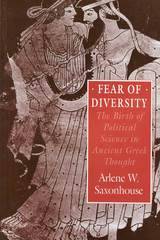
Saxonhouse opens up fresh understandings of such issues as the Greeks' fear of the feminine and their attempts to ignore the demands that gender, reproduction, and the family inevitably make on the individual.

Why the Greeks? How did it happen that these people—out of all Mediterranean societies—developed democratic systems of government? The outstanding German historian of the ancient world, Christian Meier, reconstructs the process of political thinking in Greek culture that led to democracy. He demonstrates that the civic identity of the Athenians was a direct precondition for the practical reality of this form of government.
Meier shows how the structure of Greek communal life gave individuals a civic role and discusses a crucial reform that institutionalized the idea of equality before the law. In Greek drama—specifically Aeschylus' Oresteia—he finds reflections of the ascendancy of civil law and of a politicizing of life in the city-state. He examines the role of the leader as well as citizen participation in Athenian democracy and describes an ancient equivalent of the idea of social progress. He also contrasts the fifth-century Greek political world with today's world, drawing revealing comparisons.
The Greek Discovery of Politics is important reading for ancient historians, classicists, political scientists, and anyone interested in the history of political thought or in the culture of ancient Greece.


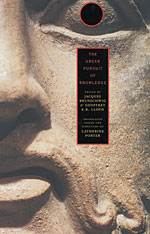

Ancient Greek thought is the essential wellspring from which the intellectual, ethical, and political civilization of the West draws and to which, even today, we repeatedly return. In more than sixty essays by an international team of scholars, this volume explores the full breadth and reach of Greek thought--investigating what the Greeks knew as well as what they thought about what they knew, and what they believed, invented, and understood about the conditions and possibilities of knowing. Calling attention to the characteristic reflexivity of Greek thought, the analysis in this book reminds us of what our own reflections owe to theirs.
In sections devoted to philosophy, politics, the pursuit of knowledge, major thinkers, and schools of thought, this work shows us the Greeks looking at themselves, establishing the terms for understanding life, language, production, and action. The authors evoke not history, but the stories the Greeks told themselves about history; not their poetry, but their poetics; not their speeches, but their rhetoric. Essays that survey political, scientific, and philosophical ideas, such as those on Utopia and the Critique of Politics, Observation and Research, and Ethics; others on specific fields from Astronomy and History to Mathematics and Medicine; new perspectives on major figures, from Anaxagoras to Zeno of Elea; studies of core traditions from the Milesians to the various versions of Platonism: together these offer a sense of the unquenchable thirst for knowledge that marked Greek civilization--and that Aristotle considered a natural and universal trait of humankind. With thirty-two pages of color illustrations, this work conveys the splendor and vitality of the Greek intellectual adventure.
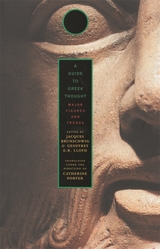

Hallowed Stewards closely examines those magistracies that were central to Athenian religious efforts, and which are best described as “sacred treasurers.” Given the extensive but fragmentary evidence available to us, which consists mainly of inscriptions but includes such texts as the ps.-Aristotelian Constitution of the Athenians, no catalog-like approach to these offices could properly encompass their details, much less their wider significance. By situating the sacred treasurers within a broader religious and historical framework, Hallowed Stewards not only provides an incisive portrait of the treasurers themselves but also elucidates how sacred property and public finance alike developed in ancient Athens.
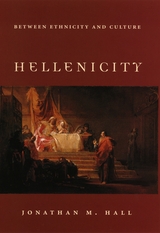
With Hellenicity, Jonathan M. Hall explores these questions in the context of ancient Greece, drawing on an exceptionally wide range of evidence to determine when, how, why, and to what extent the Greeks conceived themselves as a single people. Hall argues that a subjective sense of Hellenic identity emerged in Greece much later than is normally assumed. For instance, he shows that the four main ethnic subcategories of the ancient Greeks—Akhaians, Ionians, Aiolians, and Dorians—were not primordial survivals from a premigratory period, but emerged in precise historical circumstances during the eighth and seventh centuries B.C. Furthermore, Hall demonstrates that the terms of defining Hellenic identity shifted from ethnic to broader cultural criteria during the course of the fifth century B.C., chiefly due to the influence of Athens, whose citizens formulated a new Athenoconcentric conception of "Greekness."


Hellenistic history.
The historian Polybius (ca. 200–118 BC) was born into a leading family of Megalopolis in the Peloponnese (Morea) and served the Achaean League in arms and diplomacy for many years, favoring alliance with Rome. From 168 to 151 he was held hostage in Rome, where he became a friend of Lucius Aemilius Paulus and his two sons, especially Scipio Aemilianus, whose campaigns, including the destruction of Carthage, he later attended. Late in his life he became a trusted mediator between Greece and the Romans; helped in the discussions that preceded the final war with Carthage; and after 146 was entrusted by the Romans with the details of administration in Greece.
Polybius’ overall theme is how and why the Romans spread their power as they did. The main part of his history covers the years 264–146 BC, describing the rise of Rome, her destruction of Carthage, and her eventual domination of the Greek world. It is a great work: accurate, thoughtful, largely impartial, based on research, and full of insight into customs, institutions, geography, the causes of events, and the character of peoples. It is a vital achievement of the first importance despite the incomplete state in which all but the first five of its original forty books have reached us.
For this edition, W. R. Paton’s excellent translation, first published in 1922, has been thoroughly revised, the Büttner-Wobst Greek text corrected, and explanatory notes and a new introduction added, all reflecting the latest scholarship.
The Loeb Classical Library edition of Polybius is in six volumes.

Hellenistic history.
The historian Polybius (ca. 200–118 BC) was born into a leading family of Megalopolis in the Peloponnese (Morea) and served the Achaean League in arms and diplomacy for many years, favoring alliance with Rome. From 168 to 151 he was held hostage in Rome, where he became a friend of Lucius Aemilius Paulus and his two sons, especially Scipio Aemilianus, whose campaigns, including the destruction of Carthage, he later attended. Late in his life he became a trusted mediator between Greece and the Romans; helped in the discussions that preceded the final war with Carthage; and after 146 was entrusted by the Romans with the details of administration in Greece.
Polybius’ overall theme is how and why the Romans spread their power as they did. The main part of his history covers the years 264–146 BC, describing the rise of Rome, her destruction of Carthage, and her eventual domination of the Greek world. It is a great work: accurate, thoughtful, largely impartial, based on research, and full of insight into customs, institutions, geography, the causes of events, and the character of peoples. It is a vital achievement of the first importance despite the incomplete state in which all but the first five of its original forty books have reached us.
For this edition, W. R. Paton’s excellent translation, first published in 1922, has been thoroughly revised, the Büttner-Wobst Greek text corrected, and explanatory notes and a new introduction added, all reflecting the latest scholarship.
The Loeb Classical Library edition of Polybius is in six volumes.
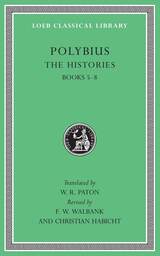
Hellenistic history.
The historian Polybius (ca. 200–118 BC) was born into a leading family of Megalopolis in the Peloponnese (Morea) and served the Achaean League in arms and diplomacy for many years, favoring alliance with Rome. From 168 to 151 he was held hostage in Rome, where he became a friend of Lucius Aemilius Paulus and his two sons, especially Scipio Aemilianus, whose campaigns, including the destruction of Carthage, he later attended. Late in his life he became a trusted mediator between Greece and the Romans; helped in the discussions that preceded the final war with Carthage; and after 146 was entrusted by the Romans with the details of administration in Greece.
Polybius’ overall theme is how and why the Romans spread their power as they did. The main part of his history covers the years 264–146 BC, describing the rise of Rome, her destruction of Carthage, and her eventual domination of the Greek world. It is a great work: accurate, thoughtful, largely impartial, based on research, and full of insight into customs, institutions, geography, the causes of events, and the character of peoples. It is a vital achievement of the first importance despite the incomplete state in which all but the first five of its original forty books have reached us.
For this edition, W. R. Paton’s excellent translation, first published in 1922, has been thoroughly revised, the Büttner-Wobst Greek text corrected, and explanatory notes and a new introduction added, all reflecting the latest scholarship.
The Loeb Classical Library edition of Polybius is in six volumes.
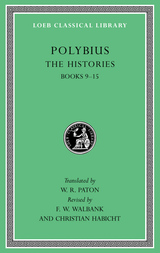
Hellenistic history.
The historian Polybius (ca. 200–118 BC) was born into a leading family of Megalopolis in the Peloponnese (Morea) and served the Achaean League in arms and diplomacy for many years, favoring alliance with Rome. From 168 to 151 he was held hostage in Rome, where he became a friend of Lucius Aemilius Paulus and his two sons, especially Scipio Aemilianus, whose campaigns, including the destruction of Carthage, he later attended. Late in his life he became a trusted mediator between Greece and the Romans; helped in the discussions that preceded the final war with Carthage; and after 146 was entrusted by the Romans with the details of administration in Greece.
Polybius’ overall theme is how and why the Romans spread their power as they did. The main part of his history covers the years 264–146 BC, describing the rise of Rome, her destruction of Carthage, and her eventual domination of the Greek world. It is a great work: accurate, thoughtful, largely impartial, based on research, and full of insight into customs, institutions, geography, the causes of events, and the character of peoples. It is a vital achievement of the first importance despite the incomplete state in which all but the first five of its original forty books have reached us.
For this edition, W. R. Paton’s excellent translation, first published in 1922, has been thoroughly revised, the Büttner-Wobst Greek text corrected, and explanatory notes and a new introduction added, all reflecting the latest scholarship.
The Loeb Classical Library edition of Polybius is in six volumes.
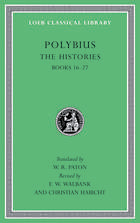
Hellenistic history.
The historian Polybius (ca. 200–118 BC) was born into a leading family of Megalopolis in the Peloponnese (Morea) and served the Achaean League in arms and diplomacy for many years, favoring alliance with Rome. From 168 to 151 he was held hostage in Rome, where he became a friend of Lucius Aemilius Paulus and his two sons, especially Scipio Aemilianus, whose campaigns, including the destruction of Carthage, he later attended. Late in his life he became a trusted mediator between Greece and the Romans; helped in the discussions that preceded the final war with Carthage; and after 146 was entrusted by the Romans with the details of administration in Greece.
Polybius’ overall theme is how and why the Romans spread their power as they did. The main part of his history covers the years 264–146 BC, describing the rise of Rome, her destruction of Carthage, and her eventual domination of the Greek world. It is a great work: accurate, thoughtful, largely impartial, based on research, and full of insight into customs, institutions, geography, the causes of events, and the character of peoples. It is a vital achievement of the first importance despite the incomplete state in which all but the first five of its original forty books have reached us.
For this edition, W. R. Paton’s excellent translation, first published in 1922, has been thoroughly revised, the Büttner-Wobst Greek text corrected, and explanatory notes and a new introduction added, all reflecting the latest scholarship.
The Loeb Classical Library edition of Polybius is in six volumes.
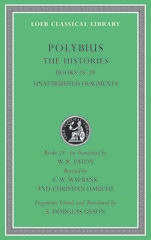
Hellenistic history.
The historian Polybius (ca. 200–118 BC) was born into a leading family of Megalopolis in the Peloponnese (Morea) and served the Achaean League in arms and diplomacy for many years, favoring alliance with Rome. From 168 to 151 he was held hostage in Rome, where he became a friend of Lucius Aemilius Paulus and his two sons, especially Scipio Aemilianus, whose campaigns, including the destruction of Carthage, he later attended. Late in his life he became a trusted mediator between Greece and the Romans; helped in the discussions that preceded the final war with Carthage; and after 146 was entrusted by the Romans with the details of administration in Greece.
Polybius’ overall theme is how and why the Romans spread their power as they did. The main part of his history covers the years 264–146 BC, describing the rise of Rome, her destruction of Carthage, and her eventual domination of the Greek world. It is a great work: accurate, thoughtful, largely impartial, based on research, and full of insight into customs, institutions, geography, the causes of events, and the character of peoples. It is a vital achievement of the first importance despite the incomplete state in which all but the first five of its original forty books have reached us.
For this edition, W. R. Paton’s excellent translation, first published in 1922, has been thoroughly revised, the Büttner-Wobst Greek text corrected, and explanatory notes and a new introduction added, all reflecting the latest scholarship.
The Loeb Classical Library edition of Polybius is in six volumes.
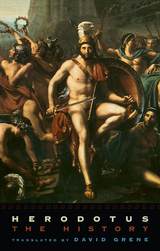
Here is the historian, investigating and judging what he has seen, heard, and read, and seeking out the true causes and consequences of the great deeds of the past. In his History, the war between the Greeks and Persians, the origins of their enmity, and all the more general features of the civilizations of the world of his day are seen as a unity and expressed as the vision of one man who as a child lived through the last of the great acts in this universal drama.
In Grene's remarkable translation and commentary, we see the historian as a storyteller, combining through his own narration the skeletal "historical" facts and the imaginative reality toward which his story reaches. Herodotus emerges in all his charm and complexity as a writer and the first historian in the Western tradition, perhaps unique in the way he has seen the interrelation of fact and fantasy.
"Reading Herodotus in English has never been so much fun. . . . Herodotus crowds his fresco-like pages with all shades of humanity. Whether Herodotus's view is 'tragic,' mythical, or merely common sense, it provided him with a moral salt with which the diversity of mankind could be savored. And savor it we do in David Grene's translation."—Thomas D'Evelyn, Christian Science Monitor
"Grene's work is a monument to what translation intends, and to what it is hungry to accomplish. . . . Herodotus gives more sheer pleasure than almost any other writer."—Peter Levi, New York Times Book Review
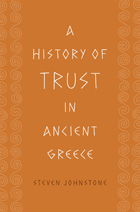
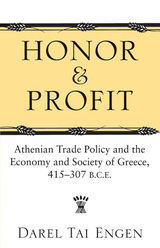
Honor and Profit offers a welcome corrective to the outmoded Finleyite view of the ancient economy. This important volume collects and analyzes economic evidence including government decrees for all known occasions on which Athens granted honors and privileges for services relating to trade.
The analysis proceeds within the intellectual framework of substantive economic theory, in which formal market behavior and institutions are considered to be but a subset of a larger group of economic behaviors and institutions devoted to the production, distribution, and exchange of goods.
Honor and Profit merges theory with empirical historical evidence to illustrate the complexity and dynamism of the ancient Greek economy. The author's conclusions have broad implications for our understanding not only of Athens and environs but also of the social and political history of Greece and the ancient Mediterranean world.
Darel Tai Engen is Associate Professor of History at California State University, San Marcos.
Also of interest
An Introduction to Greek Epigraphy of the Hellenistic and Roman Periods from Alexander the Great down to the Reign of Constantine (323 B.C.---A.D. 337)
By B. H. McLean
The Athenian Empire Restored: Epigraphic and Historical Studies
By Harold B. Mattingly
The Athenian Experiment: Building an Imagined Political Community in Ancient Attica, 508---490 B.C.
By Greg Anderson
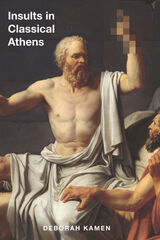
While the classical city celebrated the democratic equality of "autochthonous" citizens, it counted a large population of noncitizens as inhabitants, so that ancient Athenians developed a preoccupation with negotiating, affirming, and restricting citizenship. Kamen raises key questions about what it meant to be a citizen in democratic Athens and demonstrates how insults were deployed to police the boundaries of acceptable behavior. In doing so, she illuminates surprising differences between antiquity and today and sheds light on the ways a democratic society valuing "free speech" can nonetheless curb language considered damaging to the community as a whole.
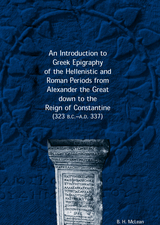
“In short, this is a reference work of the best kind. For the beginner, it is indispensable. And for those who already know something about its subject matter, the book is in many ways useful, informative, and interesting. We all owe a debt to [the author] for undertaking this significant project, and for completing it so well.”
—Michael Peachin, Classical World
“. . . provides invaluable road maps for non-epigraphers faced with passages of inscribed Greek.”
—Graham Shipley, Bryn Mawr Classical Review
Greek inscriptions form a valuable resource for the study of all aspects of the Greco-Roman world. They are primary witnesses to society's laws and institutions, religious habits, and language. This volume provides students with the tools to take advantage of the historical value of these treasures. It examines letter forms, ancient names, and ancient calendars, knowledge of which is essential in reading inscriptions of all kinds.
B. H. McLean discusses the classification of inscriptions into their various categories and analyzes particular types of inscriptions, including decrees, honorary inscriptions, dedications, funerary inscriptions, and manumissions. Finally, McLean includes special topics that bear upon the interpretation of specific features of inscriptions, such as Greek and Roman administrative titles and functions.
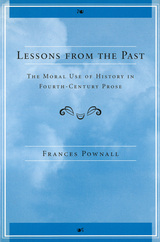
Frances Pownall is Professor of History and Classics, University of Alberta.
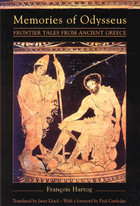
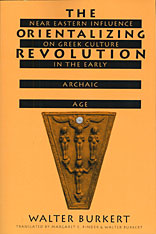
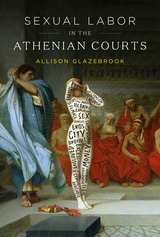
Oratory is a valuable source for reconstructing the practices, legalities, and attitudes surrounding sexual labor in classical Athens. It provides evidence of male and female sex laborers, sex slaves, brothels, sex traffickers, the cost of sex, contracts for sexual labor, and manumission practices for sex slaves. Yet the witty, wealthy, and independent hetaira, well-known from other genres, does not feature. Its detailed narratives and character portrayals provide a unique discourse on sexual labor and reveal the complex relationship between such labor and Athenian society.
Through a holistic examination of five key speeches, Sexual Labor in the Athenian Courts considers how portrayals of sex laborers intersected with gender, the body, sexuality, the family, urban spaces, and the polis in the context of the Athenian courts. Drawing on gender theory and exploring questions of space, place, and mobility, Allison Glazebrook shows how sex laborers represented a diverse set of anxieties concerning social legitimacy and how the public discourse about them is in fact a discourse on Athenian society, values, and institutions.
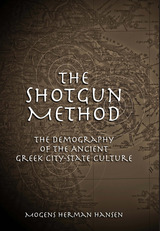
Although the polis, or city-state, defined the essence of classical Greek civilization, evidence of its most basic characteristics is woefully inadequate. Now a leading scholar in the evaluation of data from the ancient world sheds new light on how those units were constituted.
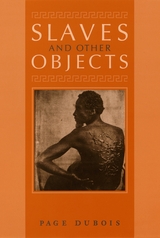
DuBois begins her study by exploring the material culture of slavery, including how most museum exhibits erase the presence of slaves in the classical world. Shifting her focus to literature, she considers the place of slaves in Plato's Meno, Aristotle's Politics, Aesop's Fables, Aristophanes' Wasps, and Euripides' Orestes. She contends throughout that portraying the difference between slave and free as natural was pivotal to Greek concepts of selfhood and political freedom, and that scholars who idealize such concepts too often fail to recognize the role that slavery played in their articulation.
Opening new lines of inquiry into ancient culture, Slaves and Other Objects will enlighten classicists and historians alike.
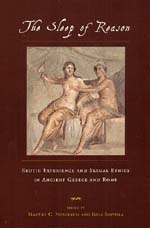
The Sleep of Reason brings together an international group of philosophers, philologists, literary critics, and historians to consider two questions normally kept separate: how is erotic experience understood in classical texts of various kinds, and what ethical judgments and philosophical arguments are made about sex? From same-sex desire to conjugal love, and from Plato and Aristotle to the Roman Stoic Musonius Rufus, the contributors demonstrate the complexity and diversity of classical sexuality. They also show that the ethics of eros, in both Greece and Rome, shared a number of commonalities: a focus not only on self-mastery, but also on reciprocity; a concern among men not just for penetration and display of their power, but also for being gentle and kind, and for being loved for themselves; and that women and even younger men felt not only gratitude and acceptance, but also joy and sexual desire.
Contributors:
* Eva Cantarella
* Kenneth Dover
* Chris Faraone
* Simon Goldhill
* Stephen Halliwell
* David M. Halperin
* J. Samuel Houser
* Maarit Kaimio
* David Konstan
* David Leitao
* Martha C. Nussbaum
* A. W. Price
* Juha Sihvola
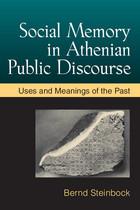
Integrating literary, epigraphic, and archaeological evidence with recent scholarship on memory, identity, rhetoric, and international relations, Social Memory in Athenian Public Discourse: Uses and Meanings of the Past enhances our understanding of both the function of memory in Athenian public discourse and the history of Athenian-Theban relations. It should be of interest not only to students of Greek history and oratory but to everybody interested in memory studies, Athenian democracy, and political decision making.
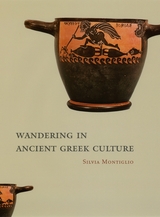
Attitudes toward wandering have evolved in accordance with cultural perspectives, causing some characterizations to persist while others have faded. For instance, the status of wanderers in Greek societies varied from outcasts and madmen to sages, who were recognized as mystical, even divine. Examining the act of wandering through many lenses, Wandering in Ancient Greek Culture shows how the transformation of the wanderer coincided with new perceptions of the world and of travel and invites us to consider its definition and import today.
READERS
Browse our collection.
PUBLISHERS
See BiblioVault's publisher services.
STUDENT SERVICES
Files for college accessibility offices.
UChicago Accessibility Resources
home | accessibility | search | about | contact us
BiblioVault ® 2001 - 2024
The University of Chicago Press









